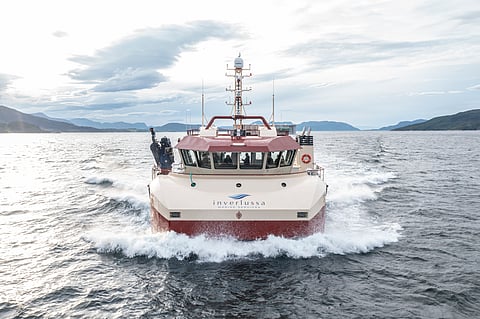

The new vessel will join other existing vessels, such as the one in the picture, Charlie Knight, and will expand Inverlussa Marine Services' fleet to 23 units.
Photo: Inverlussa Marine Services.
Scottish aquaculture support company Inverlussa Marine Services awarded a multi-million-pound contract to Macduff Shipyards for the design and construction of a new hybrid workboat. The 25-meter vessel will be equipped with the latest technology to support the sustainable growth of the industry in Scotland.
The plan is for the workboat to be operational supporting salmon farms on the west coast as well as in Shetland and Orkney in the third quarter of 2025, so construction work is expected to begin shortly. The contract is also expected to create six additional jobs within the construction company, bringing the total number of employees to 140.
That job creation was one of the aspects highlighted by the trade organization Salmon Scotland following the signing. The event was also attended by Scotland's Deputy First Minister, Kate Forbes, underlining with her presence the vital role that salmon farming - the UK's largest food export, supporting 12,500 jobs and generating GBP 760 million (EUR 906.2 million / USD 990.7 million) - plays in boosting the livelihoods of the country's coastal communities.
"Inverlussa’s latest vessel will bring more high-quality jobs to Scotland while harnessing green technologies to support our net zero ambitions," said Forbes. "It is crucial that we continue to embrace innovation in aquaculture practices so that the sector can become resilient to the pressing challenges posed by climate change."
Inverlussa Marine Services and Macduff Shipyards contract signing. From left to right, Ben Wilson (managing director, Inverlussa Marine Services), Naomi Knight (project co-ordinator, Inverlussa Marine Services), John Watt (managing director, Macduff Shipyards) and Deputy First Minister Kate Forbes MSP.
Photo: Salmon Scotland.
The Deputy First Minister continued her remarks by recalling that the Scottish Government's 'Vision for Sustainable Aquaculture' sets out its aspirations for a thriving and innovative sector. "The deployment of new hybrid technologies is a great example of how innovation can contribute to the sustainable development of Scottish aquaculture," Forbes commented.
As John Watt, managing director at MacDuff Shipyards, pointed out, the vessel's design has been "very carefully considered" to the point of redesigning the propulsion package to ensure the workboat is as energy efficient as possible.
Thus, in addition to having a hybrid battery pack, although not mandatory, the company has chosen to comply with the International Maritime Organization's strict Tier 3 emissions standards. This will achieve an 80% reduction in nitrogen oxide emissions compared to Tier 2 to significantly curb greenhouse gases, enhancing the vessel's eco-friendly credentials.
Intended to service larger sites operating in deeper, more exposed, and remote offshore locations, the workboat's design also emphasizes advanced sea-keeping capabilities to provide a stable platform in rough seas.
Likewise, it will be equipped with enhanced crane capabilities and deck equipment, including larger, heavy-duty towing winches designed to lift and tow heavy objects such as feed barges. This specialized equipment will not only improve the mooring and grid handling capabilities of the salmon farms of the companies using it but will also maximize the safety and capacity of the vessel and its crew.
Macduff Shipyards' design includes five ensuite cabins and a significant focus on noise reduction, especially when conducting 24-hour operations, to improve crew comfort and living conditions on board. Once completed, the new workboat - which will expand Inverlussa Marine Services' purpose-built fleet to 23 units - will operate with a crew of six.
Profile of Inverlussa Marine Services' new vessel to be built by Q3 2025.
Image: Inverlussa Marine Services.
"This is a state-of-the-art vessel from a Scottish shipyard with a first-class track record of building quality vessel for the aquaculture sector," pointed out Ben Wilson, managing director of Inverlussa Marine Services.
"As well as providing a much-needed boost to the Scottish shipbuilding industry, the addition of this vessel to our fleet will provide even greater capacity to our thriving Scottish salmon sector and provide increased capacity and capability in supporting salmon farming operations to operate as efficiently and sustainably as possible," he added.
Wilson, who recalled that Inverlussa employs more than 130 people along the west coast of Scotland, emphasized that the fact that the Deputy First Minister of Scotland attended the signing of this contract demonstrates the importance of the salmon aquaculture sector to the Scottish economy and to the many local communities that benefit from its farming.
Tavish Scott, CEO of Salmon Scotland, spoke in the same vein. "Inverlussa and Macduff are leaders in the Scottish shipping industry and shining examples of the more than 3,600 supply chain businesses that make an essential contribution to the Scottish salmon sector," he said.
"The significant investment in new vessels with a greener footprint will enable our farmers to operate even more sustainably, regardless of the weather, and generate highly paid, highly skilled jobs, and prosperity in our rural and coastal communities," he added. And concluded, "When we grow salmon, we grow our economy."
